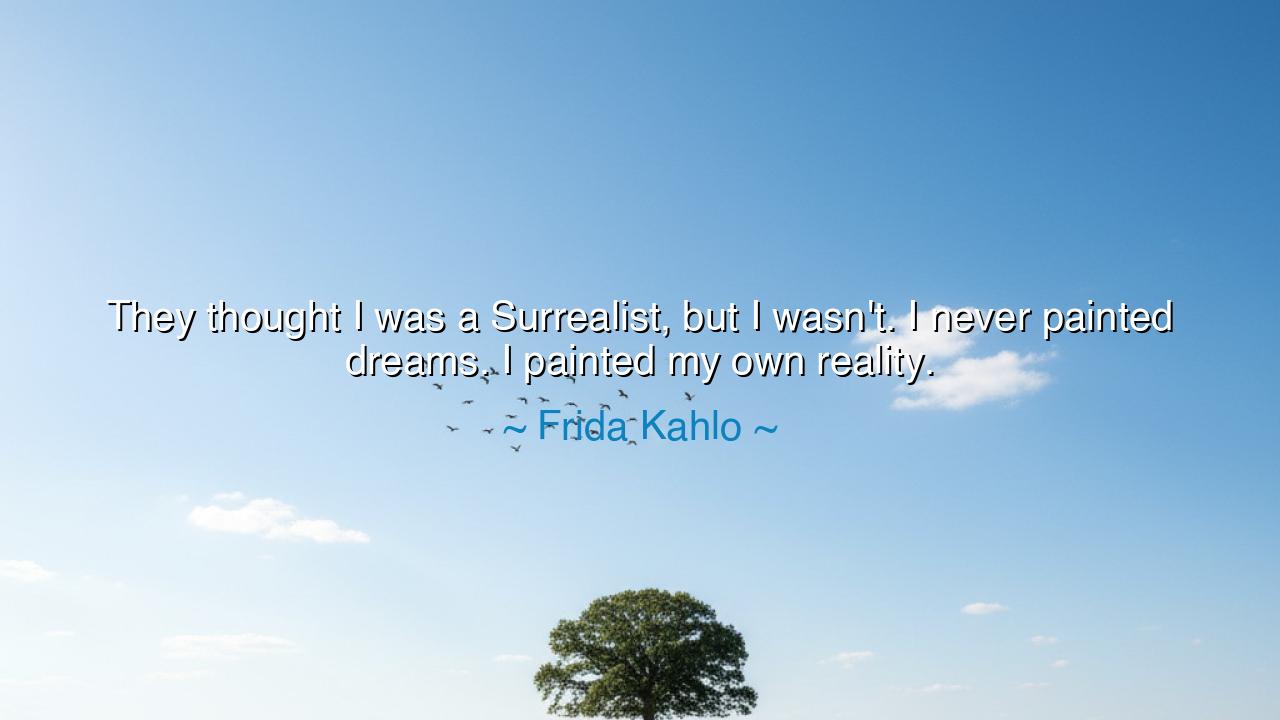
They thought I was a Surrealist, but I wasn't. I never painted
They thought I was a Surrealist, but I wasn't. I never painted dreams. I painted my own reality.






Here is an ancient-style reflection on Frida Kahlo’s quote:
The Reality of the Soul
When Frida Kahlo said, “They thought I was a Surrealist, but I wasn’t. I never painted dreams. I painted my own reality,” she spoke with the defiance of one who had transformed pain into art and sorrow into strength. Her words echo like the cry of a warrior-artist — a soul who refused to be labeled or misunderstood. In them lies a timeless truth: that art, when it is honest, is not an escape from life but a confrontation with it. She did not paint fantasy; she painted the raw, unvarnished truth of her own experience, and in doing so, revealed the universality of human suffering and beauty.
The meaning of her words lies in the distinction between illusion and authenticity. The Surrealists painted dreams — visions unbound by reason or reality, fragments of the subconscious turned into color and form. But Kahlo’s art was born not from fantasy, but from the body and the spirit — from the wounds of life itself. Her canvases were not windows into another world, but mirrors reflecting her own soul. Through her reality, she showed that truth is often more astonishing than imagination, that the human heart, in its joy and anguish, surpasses even the wildest of dreams.
The origin of her declaration comes from the crucible of her own life. Struck by illness in childhood, shattered by an accident in youth, and betrayed by love in adulthood, Frida Kahlo lived in a body that was both her prison and her muse. While others fled from pain, she faced it. Every brushstroke became a testimony of endurance — a vivid testament to the strength of the human spirit. When critics called her a Surrealist, they sought to categorize her pain as imagination. But she refused such simplification. “I paint my own reality,” she said — because what she lived, though extraordinary, was real.
The ancients, too, understood this union of pain and truth. Consider the Greek hero Prometheus, who stole fire from the gods to give light to humankind. For his defiance, he was bound to a rock, condemned to eternal torment. Yet even in agony, his suffering illuminated the world. So too did Kahlo’s art: born of torment, yet radiant with defiance. Like Prometheus, she transformed suffering into creation. Her brush was her fire, her canvas the world she refused to leave in darkness.
Her words carry a message not just for artists, but for all who live. In a world that teaches us to hide our pain and to pretend perfection, she reminds us that truth is sacred. To live authentically — to paint, write, speak, or simply exist without disguise — is the highest form of courage. Those who deny their reality become prisoners of illusion; those who embrace it, no matter how difficult, become free. Kahlo’s life teaches that even brokenness can be beautiful when it is embraced honestly.
And yet, her wisdom is not of despair, but of empowerment. She invites us to reclaim our stories — to make art, love, and meaning from the very things that have wounded us. For to express truth is to transmute it, to transform pain into something eternal. Just as the ancient alchemists sought to turn base metal into gold, so too can the soul turn suffering into beauty, if it dares to face itself without fear.
Therefore, O listener, take this lesson to heart: live your own reality, and do not let others define it for you. Do not hide behind dreams that are not yours, or ideals that belong to another age. Whether your truth is joyful or sorrowful, let it breathe, let it speak, let it shape the world around you. The courage to be real is rarer than genius, but it is the foundation of all greatness.
And when life wounds you, remember Frida Kahlo — the woman who turned pain into color, who transformed reality into revelation. For the true artist, and indeed the true human being, does not flee from life’s hardships but meets them face to face, saying, “This is my world, this is my truth, and in it — I am free.”






AAdministratorAdministrator
Welcome, honored guests. Please leave a comment, we will respond soon